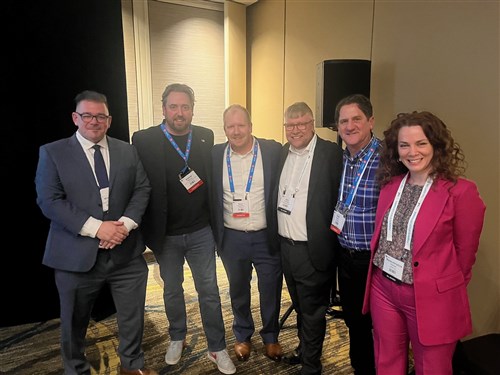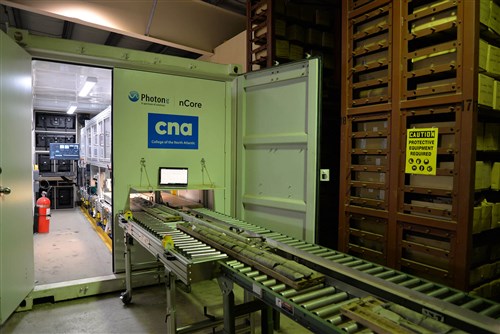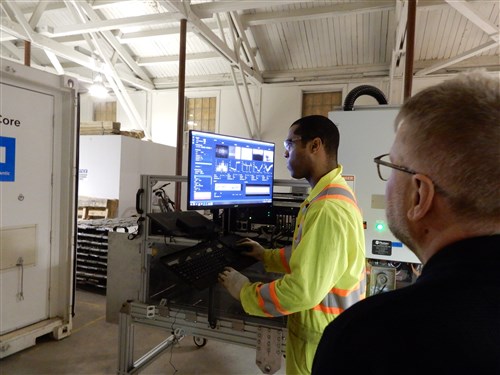For exploration and mining companies, understanding exactly what minerals are in your drill core is critical. And this process just got easier. College of the North Atlantic (CNA) and TerraCore have signed a four-year agreement that expands their growing relationship in hyperspectral mineralogical services.
CNA’s Hyperspectral Scanning Unit (HSU) examines drill cores from locations throughout Newfoundland and Labrador to produce world-class, high-resolution images using reflectance spectroscopy to give each mineral in the sample a unique colour. Similar to a fingerprint, these images quickly identify every mineral in the drill core. The process is much faster than looking at countless samples under a microscope, and unlike mineral assay testing, the sample is not destroyed.
The CNA team operating the HSU help companies learn more from their exploratory drilling activities, saving money and reducing the number of drill cores required. The unit can also help companies restore the environment when a mine has concluded operations by monitoring the minerals that remain, including in tailings and other waste, to determine which remediation measures are necessary. It can even help keep a close eye on biodiversity at the former mine site.
TerraCore processes the vast amounts of imaging data produced by these scans to help the mining sector identify rich mineral deposits.
 A high resolution photo of samples prepared for scanning (above). One of the resulting images using reflectance spectroscopy to give each mineral in the sample a unique colour (below).
A high resolution photo of samples prepared for scanning (above). One of the resulting images using reflectance spectroscopy to give each mineral in the sample a unique colour (below).
Through this agreement, CNA and TerraCore will continue working together to develop and promote the market for hyperspectral mineralogical services, benefitting students and industry.
The Honourable Andrew Parsons, Minister of Industry, Energy, and Technology, announced the agreement at this week’s Prospectors & Developers Association of Canada (PDAC) convention in Toronto.
 Minister Parsons announced the agreement at the this week’s Prospectors & Developers Association of Canada (PDAC) convention in Toronto. Pictured are, from left: CNA Dean of Applied Research and Innovation Michael Long, Minister Parsons, TerraCore CEO David Browning, CNA Dean of of Sustainable Development Gary Thompson, TerraCore Vice President of Business Development Chris Sherry, and Photon etc. Director of Business Development Marie-Christine Ferland. Photon etc. constructed CNA’s Hyperspectral Scanning Unit.
Minister Parsons announced the agreement at the this week’s Prospectors & Developers Association of Canada (PDAC) convention in Toronto. Pictured are, from left: CNA Dean of Applied Research and Innovation Michael Long, Minister Parsons, TerraCore CEO David Browning, CNA Dean of of Sustainable Development Gary Thompson, TerraCore Vice President of Business Development Chris Sherry, and Photon etc. Director of Business Development Marie-Christine Ferland. Photon etc. constructed CNA’s Hyperspectral Scanning Unit.
“Our province will certainly reap the benefits of this agreement through our growing resource industries,” Minister Parsons said. “We look forward to continuing to collaborate with our academic institutions like CNA, and industry partners like TerraCore, to explore ways we can promote and develop further extraction and exploration.”
David Browning, CEO of TerraCore, joined Minister Parsons and CNA representatives at PDAC for the announcement.
“As a technology leader in the natural resource industry, TerraCore has a long track record of working with academic institutions to assist in educating the next generation of geologists and data scientists,” Browning said. “We are delighted to continue to grow our world-class processing capabilities with College of North Atlantic. The collaboration between CNA and TerraCore will provide many long-term benefits to the industry. College of the North Atlantic’s commitment to advanced technologies and applied research, specifically in the hyperspectral space, aligns perfectly with TerraCore’s mission.”
 CNA’s Hyperspectral Scanning Unit.
CNA’s Hyperspectral Scanning Unit.
Michael Long, Dean of Applied Research and Innovation at CNA, said the agreement is a benefit to students who will now have even more opportunities to operate hyperspectral scanning technology and to work on future applied research projects.
“CNA’s partnership with TerraCore is a recognition of both the current and future impact the college is having, and will continue to have, on advancing hyperspectral imaging technologies in the extractive resources sector,” he said. “The partnership between TerraCore and CNA is wonderfully synergistic. It marries the world-class mobile hyperspectral technology at CNA with the global leader in hyperspectral data analysis that is TerraCore. Because we produce vast amounts of data from our hyperspectral scanning technologies, the ability to rapidly process this data is vital for our applied research partners.”
 CNA Dean of of Sustainable Development Gary Thompson looks on as Mineral Laboratory Assistant Kele Miguel reviews data from scans of drill core.
CNA Dean of of Sustainable Development Gary Thompson looks on as Mineral Laboratory Assistant Kele Miguel reviews data from scans of drill core.
It's a sentiment echoed by CNA’s Dean of Sustainable Development, Gary Thompson, who noted hyperspectral mineralogical services can help find the essential metals needed to progress toward a greener and more sustainable economy.
“Leveraging cutting-edge technologies such as hyperspectral imaging to bolster exploration efforts and minimize mining expenses will be instrumental in meeting the demand for critical minerals,” he said. “Collaborative initiatives, such as the agreement between the college and TerraCore, aim to deliver this technology and train future workers in its utilization.”
For more information about CNA’s hyperspectral scanning unit, visit
HSU Project (cna-spectroscopy.ca).
For more information about TerraCore’s world-leading hyperspectral imaging data processing, visit
Our Software - IntelliCore - TerraCore (terracoregeo.com).
-30-
Media Contact:
Ryan Crocker
Content Specialist
College of the North Atlantic
P: (709) 699-8981
E:
ryan.crocker@cna.nl.ca